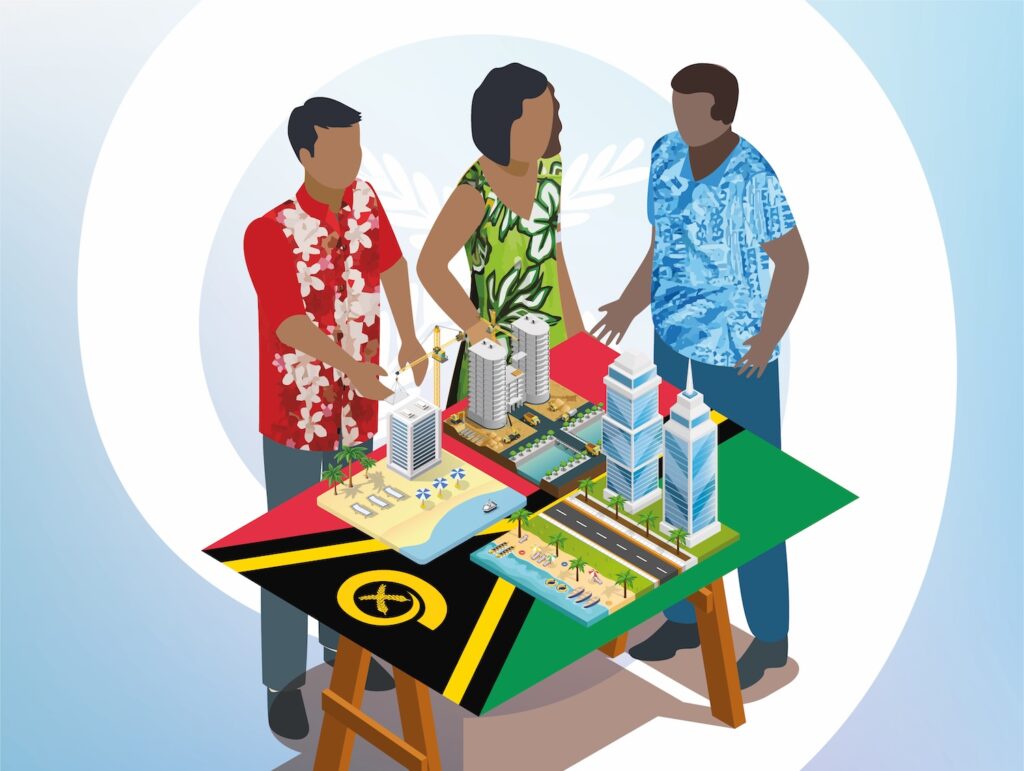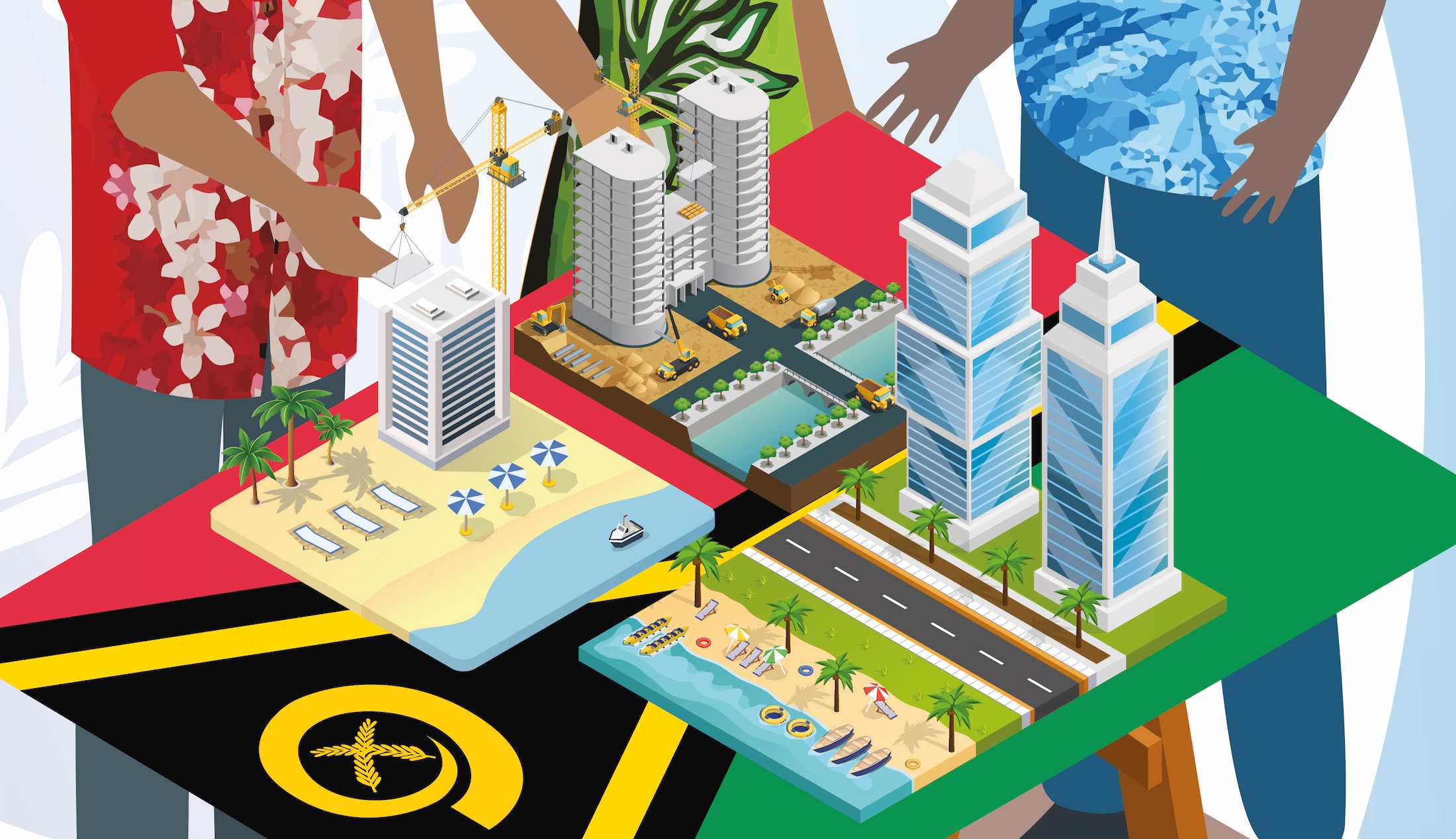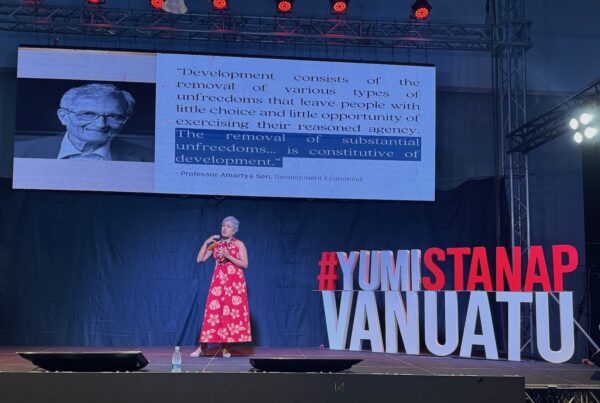By Martin St-Hilaire
The world is at a crossroads. Just as we start seeing COVID in our rearview mirror, geopolitical tectonic plates have started shifting and upheaval is everywhere, including the Pacific where new powers are emerging and new alliances are being forged.
Vanuatu may be a tiny little piece on the world’s chessboard, but it is now perfectly positioned to make some winning moves in the next decade. We can either seize the moment in front of us, and finally become a prosperous, autonomous nation, or we can sit on the sidelines and stay mired in under-development, dependent on foreign aid and soul-destroying seasonal worker schemes.

Where to start? Here are some ideas worth a second look. The list does not follow a particular order, and is of course non-exhaustive.
✔ Approaching government revenue as the consequence, not the cause
In the coming years and decades, it will be essential for our government to grow its revenue to expand and improve services, from infrastructure to education to social welfare and other much needed programs. But where will that additional revenue come from?
Anyone with a basic grasp of finance knows that businesses and consumers are prime sources of public revenue. The more economic activity, the broader the base from which the government can garner customs duties, value added taxes (VAT) and other charges, growing revenues without even having to increase the rates at which these are levied.
What fewer people understand, sadly, is that it doesn’t work the other way around. We can’t start by growing public revenue and then expect the economy to grow, because that necessarily means increasing the rates, which invariably deters business investment and consumption, causing the exact opposite to happen. The government becomes the only thing growing, while the rest of the economy stagnates and may even contract.
Sounds familiar? That’s because it’s the story of Vanuatu over the past 10 years. While our government budget doubled, our GDP only grew by about 25%. At the same time, the revenue hike was certainly not reflected in increased or improved public services. Did we double the number of hospital beds or places in our schools? Has the quality of our health and education services noticeably gone up? What about the roads? The sewage systems? Etc.
Raising revenue only produces positive outcomes if it happens as a result of economic growth. And economic growth only happens if we have a healthy private sector.
✔ Embracing the market economy at the political level
If our leaders truly strive for economic and social development, they should fully embrace a few basic principles of a market economy:
First, economic growth is essential for creating new jobs and generating new wealth that can be distributed among the community.
Second, the engine of economic growth will never be the government; it has to come from the private sector.
Third, competition must be allowed to bring better and better products and services to the consumer at lower and lower prices. This virtuous circle kicks in every time businesses are placed on a level playing field, as they will look for ways to increase efficiencies, reduce their costs, improve quality, and innovate with a view to increasing market share at the expense of their competitors.
Lately however, our government has been holding our private sector back by passing a series of laws that have made it increasingly hard for the private sector to grow and to compete. Some of our leaders have embarked on the dark path of protectionism, erecting barriers around our economy through restrictive regulation and cumbersome processes for any foreigner who wants to open a business, work, or even come for a short business trip.
While our politicians often talk about the importance of Foreign Direct Investment (FDI), they must understand that in the digital age, most industries need both computer data and human knowledge to create value. We have a painful shortage of local talent in many fields, and foreign investors won’t be willing to blindly inject money into our economy without also bringing in their own experts from abroad. In fact, the only way we’ll attract FDI is by promising investors that it will be easy for them to either recruit talent in Vanuatu or to import skilled workers if they cannot find any here. In so many words, we need an open door policy.
Today FDI is composed in large part not of investment capital, but of human and technological capital. And very often the investors and the experts are actually one and the same: they come as a package deal.
Once allowed on our shores, they contribute to economic growth, creating new jobs and developing new skills in the local workforce, and to the virtuous circle of competition that benefits local consumers. This in turn produces new public revenue to finance infrastructure, health, and education for the whole community. The next generation of Ni-Vanuatu gets more access to more knowledge, and the best and brightest find exciting career opportunities here instead of having to go work abroad.
✔ Canceling the turnover tax on service exports
A recent amendment to the Business Licence Act introduced a 5% turnover tax on service industries. This is unheard of in economies across the Asia-Pacific region, and for good reason: it’s a sure way to throttle competitiveness in global trade.
Considering Vanuatu’s lack of natural resources and manufacturing capacity, our service sector is our country’s best hope for diversifying and growing the economy and achieving financial autonomy. Exporting services is a clever way to create employment in Vanuatu and to bring in much-needed foreign currency. An educated workforce and an internet connection are all we need to compete globally in the knowledge industries of the 21st century. But a 5% tax is enough to handicap our businesses and unlevel the playing field, making Vanuatu unattractive to foreign investors in the service sector.
Instead of asking our service businesses to share a portion of their revenue, our government should remove impediments for them to compete globally, so they can generate wealth and create jobs here in Vanuatu. This will in turn boost domestic consumption, which is subject to a 15% VAT. Government revenue will grow as a consequence – which was the intention of the turnover tax in the first place.
✔ Avoiding the temptation of income taxation
Once in a while we hear from some politicians, or from representatives of NGOs and developed nations, that Vanuatu should introduce corporate and/or personal income taxes to boost government revenue and get on par with Western fiscal regimes.
While income taxes can be a great mechanism for raising and redistributing public revenue in some countries, and that will certainly be the case in Vanuatu at a future stage of development, at the moment our country is still far from ready to benefit from such a regime, let alone to implement it. We have far more pressing development priorities, and our tax base wouldn’t be large enough anyway since a significant proportion of the country’s residents operate in the informal economy (and don’t even have electricity!). Furthermore, it would impair our growth by adding a complex accounting burden to many unsophisticated businesses.
We already derive adequate revenue from sources like VAT, various licences and fees, and our economic citizenship programme. Targeting higher tax compliance and adjusting rates of current taxes could be a much more effective and quicker way of raising revenue for the government than implementing complex taxation systems that were originally intended for industrialized nations.
✔ Getting off the European Commission’s money laundering blacklist
The European Commission has been reluctant to take Vanuatu off its “list of high risk third countries”, now in its eleventh iteration (December 2023) even though its own bureaucrats found that our country did “not have strategic deficiencies in its AML/CFT regime” in a 2019 assessment. The Financial Action Task Force, which is the ultimate global authority in the matter, gave Vanuatu the all-clear back in June 2018, more than five years ago. The Financial Centre Association maintains a detailed timeline of this saga on FCA.vu.
To our knowledge the European Commission has given little justification for this discrepancy to our government, nor any concrete instruction on how to satisfy its criteria. This undue blacklisting has been a stain on our country’s reputation for too long. We’ll never know for sure the number of correspondent banks and the amount of global trade Vanuatu has missed out on due to this blacklisting, but it is reasonable to expect that we’ll do better on these two fronts once our country’s name is cleared.
While European bureaucrats have been dragging their feet on the issue, we suspect that a healthy dose of political will on our side could help resolve it quickly. A good tactic would be for Vanuatu officials to make the money laundering blacklist their first topic of conversation at every single encounter with every single politician, diplomat or business leader from all 27 EU member states. The blacklist is so indefensible on its merits that they will have to either do something or face embarrassment. Only by ignoring the issue do we give it lasting strength, and meanwhile our global trade is held back.
✔ Securing a USD correspondent bank for the National Bank of Vanuatu
Our loss of USD correspondent banking has put a damper on our economic growth, as it makes it much more complex for our businesses to engage in global trade. Being a tiny, fragile country is quite a handicap at a time when financial institutions around the world engage in “de-risking” at the first sign of weakness. We need more allies in developed countries to help raise the level of confidence towards Vanuatu. Our plea will probably reach more ears once the U.S. State Department opens its embassy in Vanuatu and we develop closer American friendships.
✔ Improving our competitiveness in the Global Mobility market
Since the European Union suspended its visa waiver for Vanuatu passport holders in early 2022, our Citizenship-by-Investment (CBI) scheme has lost some of its appeal, resulting in a double-digit drop in revenues for the government, to the dismay of our elected leaders.
There is little hope that Brussels will ever reverse its decision. Even if we tried to address the purported deficiencies in the vetting of our CBI applicants, the EU is actually engaged in a purely ideological fight against what its bureaucrats derisively call “golden passports”. In 2022 a large majority of MEPs adopted a proposal to severely handicap CBI programs around the world.
While the European political class may not like the idea of global mobility, it remains a very attractive product for many people whose current citizenship restricts freedom of movement, commerce and, in many cases, speech. But a number of countries are competing to attract these applicants, and with the loss of visa-free access to Schengen space, Vanuatu’s CBI scheme has lost its competitiveness.
Our passport still has value. Its traditional target market has been China but it can also be used by European nationals to complement their life planning or by Americans established in a country without a citizenship option but who want to renounce their U.S. citizenship. There are many use cases but they will only be compelling if we accurately adjust the price. Since the competing CBI schemes offered by Caribbean nations have increased in price lately, we might not need to lower ours too much to be competitive again and to get back to our previous revenue levels.
✔ Facilitating business visits and remote work
As a developing country we don’t have the luxury of deterring potential foreign partners and investors with cumbersome immigration rules. While we certainly must protect our national workforce from foreign competition and wage depression on lower-skilled jobs, this doesn’t mean we should close our doors to all foreign visitors who do not tick the “tourist” box on the immigration form upon their arrival.
Under current rules, short-term business travellers are subjected to a lengthy process involving a visa application and a work permit exemption. We should instead, like many countries do, provide an automatic, 90-day business visa upon arrival to individuals who are coming to meet partners, make a sale or a purchase, act as short term consultants, speak at a conference, perform at a concert, repair specialised equipment, conduct an audit procedure, explore potential investments, or engage in any one of a countless number of other professional tasks that are limited in scope and not tied to a local employment contract.
They will be prohibited from taking up employment or establishing themselves permanently in Vanuatu, but can go about their business while making a significant contribution to our economy.
A longer type of visa could also be created for “digital nomads”, i.e. all the unmoored professionals who nowadays roam the world while working for remote employers or clients. If we offer them the opportunity to come to Vanuatu with their families on a 12 or 24-month remote worker visa, they will become “super tourists” – renting our accommodations, eating in our restaurants, and buying our local products for extended periods of time.
The salaries they earn from offshore employment go directly to fuel demand in our economy. They are not interfering in the local employment market in any way, they are simply exporting their skills from Vanuatu and importing their purchasing power.
✔ Opening our borders to skilled foreign talent
Highly skilled individuals who come to work for Vanuatu employers are not stealing jobs; they’re importing brand new skills that we didn’t have before. No one among us, or too few of us, can do what they do, so market demand is not fulfilled. But while the idea of importing the skills we don’t have is sound in theory, in practice the process remains frustratingly slow for Vanuatu employers. We should remove these administrative constraints and adopt an open door policy for foreign skilled workers, along with their spouses and children. Obtaining a visa for special skills should be easy and inexpensive.
To make sure no employer tries to use the skills requirement as a way to play favourites, we can set a salary threshold at, say, Vt. 250,000/month (this is just an example). It makes sense because rare skills are expensive on the global job market, and it will be clear the candidate has been selected for what they bring to the table and for no other reason. This is how things are done in Singapore for example.
✔ Investing in the next generation
The proportion of our youth that makes it through high school remains too low to produce a local skilled workforce that meets the needs of a modern economy. But in most cases the dropouts themselves are not to blame; they just lack the adequate infrastructure, materials and teachers to learn at their full potential.
Today foreign skilled workers are essential to fill in the gaps in the labour market. But in the long run, we should give the next generation of students everything they need to study hard enough to eventually replace those foreigners, and take the reins of tomorrow’s economy. We should invest in education from primary to high school and beyond, with an accent on vocational training to develop a large variety of skills locally.
We can start by expanding the institutions that already work, such as Port Vila International School and the Lycée Français, then replicating their example elsewhere. We’ll need to build new infrastructure, buy a lot of equipment and furniture and books, and train many teachers.
This will require a lot of public funding – but it won’t happen in a vacuum. If we make progress on other priorities laid out here, we will generate enough public revenue to invest in education. These are capital expenditures that will pay dividends in the long run as we grow our local skilled workforce.
It’s time we set things right.
Readers who made it this far must sense by now that these issues – government revenue, fiscal policy, foreign investment, immigration, international blacklists – all work in concert to hold our economic development down. We must address them in a coordinated fashion to kickstart our economy and seize strategic opportunities in upcoming years.
This document lays the foundations for building a future where promising young Ni-Vanuatu can have rewarding careers in a wide array of industries, living fulfilling lives in their native land with access to quality public services.
If we start delivering on this vision together, private sector and government and members of the community, we are certain to witness in our lifetime the emergence of a generation of Ni-Vanuatu who will be more empowered than any that came before them, living and working in an economy that is running at full potential.





